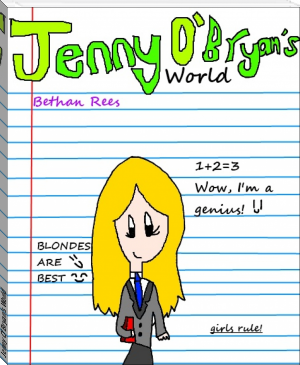The History and Records of the Elephant Club by Doesticks and Underhill (android based ebook reader TXT) 📗

- Author: Doesticks and Underhill
Book online «The History and Records of the Elephant Club by Doesticks and Underhill (android based ebook reader TXT) 📗». Author Doesticks and Underhill
"The appearance of the boys would indicate that they were of Irish birth. One had a squint-eye and a head of hair which the youth of America are accustomed to designate as 'brick-top.' His snub nose was ordinarily directed to an imaginary point in the heavens, about forty-five degrees above the horizon. His garments were not altogether the style which would be pronounced au fait, by a Broadway leader of the fashion. It would seem that he had only one purpose in view in jumping into the afore[Pg 164]said garments, which purpose was, not to create a sensation, either by the accuracy of their fit, or the newness of the material, but rather to cover his form, and keep out the cold, at such times as the clerk of the weather was induced to fetch up "heated terms" all standing, and give us a specimen of the temperature, perhaps somewhat mollified, which is supposed to exist in the immediate vicinity of Symmes Hole. The description of one of the boys will do very well for the other, except that in some particulars he was a little more so, and in others a little less, which statement, gentlemen, I consider sufficiently definite for all practical purposes.
"The sympathies of the bystanders seemed to be decidedly in favor of the boys, who were so violent in their resistance that the man could hold them only with great difficulty. Once they tripped him, and then all three fell over a barrel of turnips, upsetting a barrel-cover containing apples; but the man was enabled to continue his hold on the boys. At last, when one of them, by tangling his leg around the man, upset him into a tub of pickles, the man called out, in a shrill voice, 'Vatch! vatch!' All this transpired amid the shouts of the lookers-on. 'Go in, blinky,' said one. 'Keep a going, sour krout,' said another; and various were the remarks[Pg 165] of this character which were heard. But, as usual, the police were not at hand, and the sequel proved that their absence was rather to be desired than otherwise. Notwithstanding the fact that the sympathies of the crowd were apparently in favor of the boys, yet the general feeling seemed to be that the merits of the case should be understood, and when the boys made an effort to escape, they were prevented; and when the vanquished German had extricated himself from the pickle-tub, one of the persons asked what the boys had done.
"'Do,' said the grocery-keeper, 'dey do so much as to sends dem to de States brison. Dey is de vorst poys as runs in de shtreets. De oder night dey comes here to mine shtore-crocery a koople of times, and ven I vas not see dem, dey ketch my cats by de dails, and dies vire-crackers to de cat's dail, on de shtep-valk, and den sets vire to de crackers, and trows de cats down. Den de cats she runs like de tuyvel into de shtore so much scare. She yump all around on de counters, over into de barrels, breaks into bieces some new bottles vat I buy yust, sets vire to some paper vat vas lay on de counters, tumbles over ebery dings vat vas in de vay, and gets all shplitter shplatter mixed up togedder. I find some shweet oil bottles shpill in de box fon green dea; she knock[Pg 166] down fom de shelf a big match-box, vich hold a gross fon matches, and dey go off and shmell so vorse mit primstone as if de tuyvel had moved into mine shtore-crocery, and I can't tell you so much damage as it do; and ven I look for de cats, I find her about an hour rolled up in a pasket fon green beas, mit all de hair scorch off de pehind side fon her. Dis vas on Saturday night vill be two veeks.'
"'Why didn't you catch them then?' asked one of the party.
"'Ketch dem,' said the grocery-man; 'pefore I vas get over mine scare, dey vas run avay, and you might yust so vell try to find a needle mit a hay-shtacks as to find dem. But I tells de constopples about dem, and dey say dey vill look out for dem. Vell, two tree days go by, and von morning I comes down shtairs to unlocks de door fon mine shtore-crocery. De key vas in de inside de door, and ven I durns dem round to unlock dem yust, I hears some-dings shoot off on de oder side de door. I vas much scare, and I runs up shtairs, for I dinks some feller vants to shoot me, and I sends my vife out de oder door to look round on de shtep-walk, and see who vas dere. Ven she come back she say der bin no beeples dere, and so I go vonce more to unlocks de door. I durns de key so quick as I can, ven pop![Pg 167] crack! shoot! I hears again de noise. I vas so much scare dat I falls over, and I bulls de door open. Ven I finds I vas not shoot, I looks in de lock and finds dere some bieces baper, vat you make de little vite vire-crackers—you call'——
"'Torpedoes,' suggested one of the persons present.
"'Yes, dorpedoes,' resumed the German, 'dat's the name.'
"'How do you know these boys put torpedoes in your lock?' asked one.
"'I know it so vell as I vants to know,' was the response.
"'Did you see 'em do it, or did anybody else? was the next question.
"'No, I did not see dem do it, but I know it was dem I can, shvear it vas dem,' said the confident accuser.
"'Pretty good swearin,' said a man in a red shirt. 'Say, old sour krout,' he continued, 'what else have the boys done?'
"'Mine Gott!' said the corner grocery-man, despairingly, 'is dat not enough vat I have tell you? Ven I go out my shtore-crocery for a minute, vonce dey durns de shpiggot fon de lager bier and vinegar parrells, and dey runs out in de floor and vaste; ven doy see me in de shtreets dey calls me 'Old nicht's[Pg 168] cum araus, sour kraut, sprech Deutsch.' Dey finds dead rats, and trovs dem on mine awning till dey shmells so bad; dey brings an old barber's pole, and sets dem up before mine shtore-crocery, on vich vas paint, 'shaving done here,' and ven de beeples see de sign, dey laughs and say good, and it make all mine customers dink dat I cheat dem.'
"'Is that all?' inquired a bystander.
"'No,' said the German, emphatically, 'I can tell you more as dat.'
"'But how do you know these boys did all these things,' inquired another.
"'All de beeples say dey is de fellers,' was the reply.
"'What did they do to-night?' inquired another of the crowd.
"'Vell I tell you dat,' said the persecuted merchant. To night I vas shtand in front von mine shtore, to talk mit a carman, who have bring some dings to me. Pretty soon, he get on his cart and drive off, and ven he shtart, a parrell von botatoes, dat shtand on de edge fon de shtep-valk, tip over in de shtreet, and de botatoes fall out and shcatter about, and the parrell it go yumping along de shtreets, mit de cart; I holler for de carman and he shtop. Ven I go to see, I find dat a rope vas tie round the parrel, and hitch to de cart-veel close; vell,[Pg 169] I bick up de botatoes, and put de parrel vonce more on de shtep-valk, and keep vatch. Soon I see dese boys come along, and dey look at me mit de tuyvel in deir eyes, and I know it vas dem. Yust den I run and ketch dem.'
"The details of the case being pretty well understood, it became a question with the crowd what should be done. The general opinion was that the boys were wrong in their continued annoyances of the Dutchman, though they did not think the case was one sufficiently aggravated to justify their being turned over either to the police or to the vengeance of the grocery-man. At last a portly old Knickerbocker, who had laughed heartily at the Dutchman's narration, essayed to act as spokesman.
"'What's your name,' said he to one of the boys with assumed gravity.
"'Mike Hannegan,' said he, 'and this 'ere boy is Barney Doolan.'
"'Oh, you young rascals,' continued the gentleman, 'you deserve to be arrested for your bad ways. You are very bad boys, you know you are, whether you are the ones who have bothered the Dutchman or not. He guessed right, I think, in supposing you to be the boys. But if these gentlemen will let you off, will you stop troubling him in the future?'[Pg 170]
"'Yes, sir,' said both of the boys, meekly.
"'Then cut stick, both of you,' said he.
"Just then an individual with a remarkable loaferish air, dressed in a blue single-breasted frock coat, with a row of military buttons, a blue cap with silver mountings, and a brass star on his breast—an individual, in brief, known as a policeman—arrived on the spot, and inquired what was the trouble. After informing him that he was a day after the fair, I left the vicinity."
When Mr. Van Dam concluded, on motion of Mr. Boggs it was
Resolved, that the members of the club do now proceed, each man for himself, to light his pipe.
The resolution was acceded to without a dissenting voter.
Dennis, Wagstaff, and Overdale, as usual, had been investigating in company, Overdale taking the lead, and Wagstaff taking notes, and all three occasionally taking egg-noggs.
A unanimous call was made for Wagstaff's notebook, which was immediately forthcoming.
The reading of Mr. Wagstaff's notes was prefaced by statements on the part of Dennis and Overdale which made the following facts apparent to the club. The previous evening the three went into a Green[Pg 171]wich street bar-room, on the invitation of Overdale to pay a visit to Delmonico's, to get a piece of pie and some cigars. Whilst partaking of the order, a singular person entered the room. His beauty was decidedly of the yard-stick character. He was long as a projected Iowa railroad, and as symmetrical as a fence-rail; his face was as expressionless as the head of Shakspeare which is seen on the drop-curtain of the Broadway Theatre, surrounded by a triple row of attenuated sausages. His square and angular shoulders made him resemble a high-shouldered pump, while his arms moved with as much ease and grace as the handle to the same. Long, black hair, parted in the middle, was soaped down until the oleaginous ends reposed upon the unctuous collar of his seedy coat. His shirt-collar, guiltless of starch, was unbuttoned at the neck and laid far back over his vest, doubtless to display a neck which, had it been cut off, was long enough to tie.
He had seated himself, and had settled down into a misanthropic quiet, when a little stubby man, with one eye—the very ideal of a Washington market butcher—happened to enter. As soon as the first-mentioned subject saw him, he jumped up, rushed at the stubby man, and had hardly touched him, before a blow from the fist of the stubby man caused[Pg 172] him to collapse on the floor. The stubby man followed up his success by pulling the nose of his fallen enemy, and threatening to give him a "tolerable shake-up, if he ever came round his shop agin'."
The conflict was brief, as it soon drew in quite a crowd, and amongst others a policeman. The tall man was pointed out as the aggressor, but the stubby man said "he didn't want to appear agin' the crack-brained cuss; that he guessed he (the said cuss) had got the worst of it."
But the assembled multitudes were not satisfied. They thought it was due to them that they should have an explanation, and as the tall individual seemed anxious, and the stubby individual didn't make any objections, a ring was formed to give the parties a chance to be heard.
The stubby man said that while the other was "exercisin' his jaw, he'd have some ham'neggs;" whilst he was eating, the tall individual told his story, which was one of blighted hopes, disappointed expectations, unrequited love, and unappreciated genius. Wagstaff's notes of his words read as follows:
"'My name is Julius Jenkins, and I have a cousin named Betsey Brown; I love my cousin Betsey; have always loved my cousin Betsey, from





Comments (0)